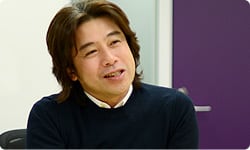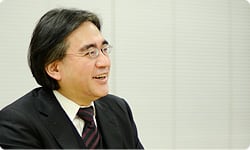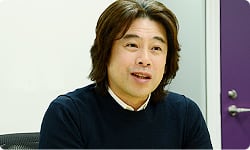Into the Trash
Minami-san, you entered Capcom as a designer, but a year later you got into planning. Were you known as a "plan man"?
I'm surprised you know about that! (laughs)
Even now, at PlatinumGames, we call him "plan man."
A plan man's work requires two attitudes—an intense passion for something he wants to make, and on the other hand, a cool head for decisions in consideration of how other people will view it.
That's right.
Did you take to that right away?
No. At first, not at all.
Well, I suppose if someone could do that from the very start, I'd like to see him! (laughs)
At first, I'd be thinking about a project and fall into self-doubt, like, "Is this really any good?" I'd think as hard as I could on into the night, but in the end I wouldn't know which way to go. Then when I took a project proposal to a senior programmer, he'd say, "That's boring," and it would go in the trash, literally. It would get tossed into the trash—plop!—right before my eyes!
That's harsh.
Yeah. It really was. But those were the times.
You couldn't make something unless the programmer said, "Ah, that'll work."
Exactly. You couldn't even get anyone to make visuals for it. When I first began work as a plan man, I thought the people around me would cooperate in achieving my ideas. But not at all!
That must be that if you can't convince those closest to you, then you certainly won't win over consumers.
You're exactly right. It was like, "Why would the customers think it's fun if we ourselves don't?"
You were sharpened as a plan man by having those people around you.
Yes. It was a pretty competitive company, so it had that "sports-team" atmosphere. But even now… (looking at Inaba-san) what I do is similar! (laughs)
Yes, that's right! (laughs)
(laughs) It's a tradition that carries on! But even though you had a hard time then, isn't that much better than actually making something only to have the public say it's no good?
Yes. But when I was young, I had trouble understanding that. (laughs)
Right, when you're young, you just can't understand those things right away. (laughs)
So I always thought it was terribly harsh.
How were you able to stand it?
Several times, I thought about quitting. Each time, I would think, "What will I do after I quit?", and be in a rut. In times like that I'd go home, all tired, and play video games!
Video games were giving you such a hard time, but you went home to play more video games.
I often wondered why that was. Video games are fun to play, so they contain the type of entertainment I want. Then one day I realized that a few people were lucky enough to be involved as a developer in something that I could get absorbed in playing games even when so tired.
Yes, we are fortunate.
Yeah. So I thought, "I'll stick with it a little longer."
Indeed, video games are something that many people play incredibly seriously and with passion, so we are fortunate to be able to create that opportunity.
Yes. I eventually realized that and persevered, but even after that, I repeatedly went home frustrated. (laughs)
What occasioned your leap forward as a plan man even after all that initial frustration?
It was the Super Ghouls'n Ghosts5 game. The Super NES came out and the first title Capcom released was Final Fight6, which was another port from an arcade game, so I worked on it. We wore ourselves out finishing that up in a really short time. Then, my boss said I could take two weeks off, which was rare.
5. Super Ghouls'n Ghosts: An action game released by Capcom for the Super NES system in October 1991.
6. Final Fight: A belt-scrolling action game that appeared in arcades in 1989. The Super NES version was released in December 1990.
Your boss wouldn't usually say that?
On occasion he had said I could take two days off on Saturday and Sunday! (laughs)
Didn't you think that was suspicious? (laughs) I heard at Capcom there is a tradition where a boss would take the staff out to eat when he plans to involve them in a challenging project.
So I took off two weeks and came back to work and he said, "We're making Super Ghouls'n Ghosts, but you know it isn't making any progress, right?"
Development had bogged down.
Right. The first stage looked done, but as a game, it simply hadn't taken form. He told me to do it. Then, for about two years, I worked on it without hardly even going home.
So after your reward of two weeks off, about two years of total absolute trial and tribulation awaited.
Yeah! (laughs) And even as the deadline closed in, we kept remaking the master ROM.
It's called a lot check when you verify that the software would runs correctly on the game console from any manufacturing lot. And that failed several times. I experienced that too, it's really tough! (laughs)
It really was! We caused Nintendo some trouble, but in the end, we took it directly to the factory and somehow got it out into the world. Super Ghouls'n Ghosts really gave us a hard time, but after release, it received great reviews.
Your hard work paid off.
Yes. I was thrilled. When I first took it on partway through development, I thought they'd really foisted a chore on me, but after release and the positive reviews, I was extremely thankful to my boss for giving it to me. That's how happy I was.
When a project ran into trouble and your boss asked you to do something about it, it was because he trusted and relied upon you. After development was over, you realized for the first time that he had entrusted you with a difficult job.
That's right. The experience of having players evaluate my work was a big turning point for me. Ever since, I've thought, "I'm going to keep doing this work the rest of my life!"



